衡水中学2019届高三期中英语答案
- 格式:doc
- 大小:42.00 KB
- 文档页数:6
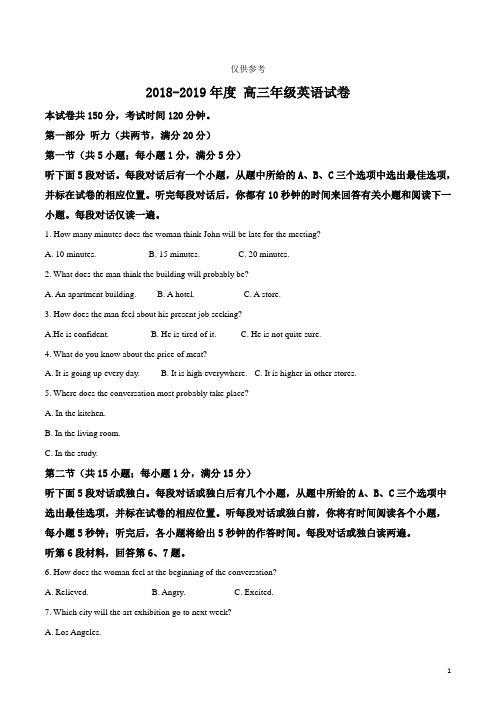
仅供参考2018-2019年度高三年级英语试卷本试卷共150分,考试时间120分钟。
第一部分听力(共两节,满分20分)第一节(共5小题;每小题1分,满分5分)听下面5段对话。
每段对话后有一个小题,从题中所给的A、B、C三个选项中选出最佳选项,并标在试卷的相应位置。
听完每段对话后,你都有10秒钟的时间来回答有关小题和阅读下一小题。
每段对话仅读一遍。
1. How many minutes does the woman think John will be late for the meeting?A. 10 minutes.B. 15 minutes.C. 20 minutes.2. What does the man think the building will probably be?A. An apartment building.B. A hotel.C. A store.3. How does the man feel about his present job seeking?A.He is confident.B. He is tired of it.C. He is not quite sure.4. What do you know about the price of meat?A. It is going up every day.B. It is high everywhere.C. It is higher in other stores.5. Where does the conversation most probably take place?A. In the kitchen.B. In the living room.C. In the study.第二节(共15小题;每小题1分,满分15分)听下面5段对话或独白。
每段对话或独白后有几个小题,从题中所给的A、B、C三个选项中选出最佳选项,并标在试卷的相应位置。
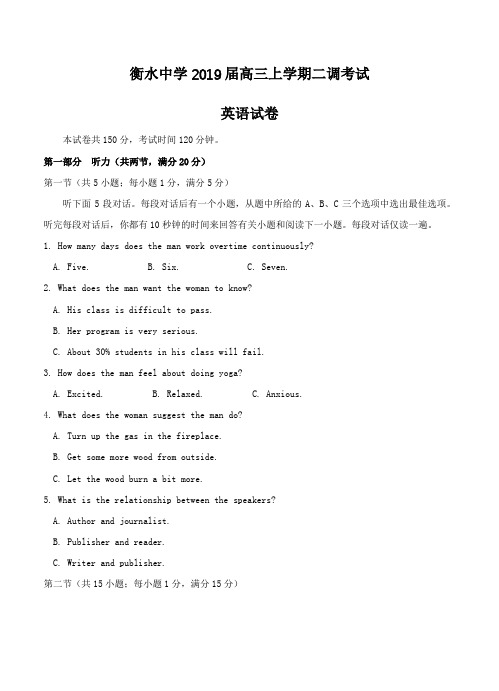
衡水中学2019届高三上学期二调考试英语试卷本试卷共150分,考试时间120分钟。
第一部分听力(共两节,满分20分)第一节(共5小题;每小题1分,满分5分)听下面5段对话。
每段对话后有一个小题,从题中所给的A、B、C三个选项中选出最佳选项。
听完每段对话后,你都有10秒钟的时间来回答有关小题和阅读下一小题。
每段对话仅读一遍。
1. How many days does the man work overtime continuously?A. Five.B. Six.C. Seven.2. What does the man want the woman to know?A. His class is difficult to pass.B. Her program is very serious.C. About 30% students in his class will fail.3. How does the man feel about doing yoga?A. Excited.B. Relaxed.C. Anxious.4. What does the woman suggest the man do?A. Turn up the gas in the fireplace.B. Get some more wood from outside.C. Let the wood burn a bit more.5. What is the relationship between the speakers?A. Author and journalist.B. Publisher and reader.C. Writer and publisher.第二节(共15小题;每小题1分,满分15分)听下面5段对话或独白。
每段对话或独白后有几个小题,从题中所给的A、B、C三个选项中选出最佳选项。
听每段对话或独白前,你将有时间阅读各个小题,每小题5秒钟;听完后,各小题将给出5秒钟的作答时间。
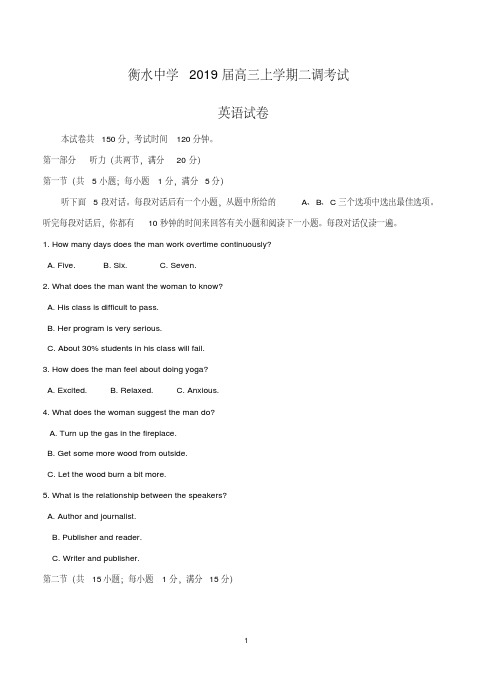
衡水中学2019届高三上学期二调考试英语试卷本试卷共150分,考试时间120分钟。
第一部分听力(共两节,满分20分)第一节(共5小题;每小题1分,满分5分)听下面5段对话。
每段对话后有一个小题,从题中所给的A、B、C三个选项中选出最佳选项。
听完每段对话后,你都有10秒钟的时间来回答有关小题和阅读下一小题。
每段对话仅读一遍。
1. How many days does the man work overtime continuously?A. Five.B. Six.C. Seven.2. What does the man want the woman to know?A. His class is difficult to pass.B. Her program is very serious.C. About 30% students in his class will fail.3. How does the man feel about doing yoga?A. Excited.B. Relaxed.C. Anxious.4. What does the woman suggest the man do?A. Turn up the gas in the fireplace.B. Get some more wood from outside.C. Let the wood burn a bit more.5. What is the relationship between the speakers?A. Author and journalist.B. Publisher and reader.C. Writer and publisher.第二节(共15小题;每小题1分,满分15分)听下面5段对话或独白。
每段对话或独白后有几个小题,从题中所给的A、B、C三个选项中选出最佳选项。
听每段对话或独白前,你将有时间阅读各个小题,每小题5秒钟;听完后,各小题将给出5秒钟的作答时间。
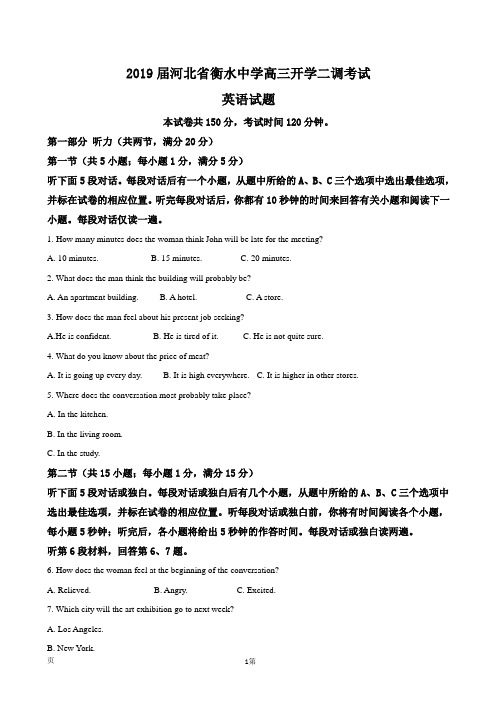
2019届河北省衡水中学高三开学二调考试英语试题本试卷共150分,考试时间120分钟。
第一部分听力(共两节,满分20分)第一节(共5小题;每小题1分,满分5分)听下面5段对话。
每段对话后有一个小题,从题中所给的A、B、C三个选项中选出最佳选项,并标在试卷的相应位置。
听完每段对话后,你都有10秒钟的时间来回答有关小题和阅读下一小题。
每段对话仅读一遍。
1. How many minutes does the woman think John will be late for the meeting?A. 10 minutes.B. 15 minutes.C. 20 minutes.2. What does the man think the building will probably be?A. An apartment building.B. A hotel.C. A store.3. How does the man feel about his present job seeking?A.He is confident.B. He is tired of it.C. He is not quite sure.4. What do you know about the price of meat?A. It is going up every day.B. It is high everywhere.C. It is higher in other stores.5. Where does the conversation most probably take place?A. In the kitchen.B. In the living room.C. In the study.第二节(共15小题;每小题1分,满分15分)听下面5段对话或独白。
每段对话或独白后有几个小题,从题中所给的A、B、C三个选项中选出最佳选项,并标在试卷的相应位置。
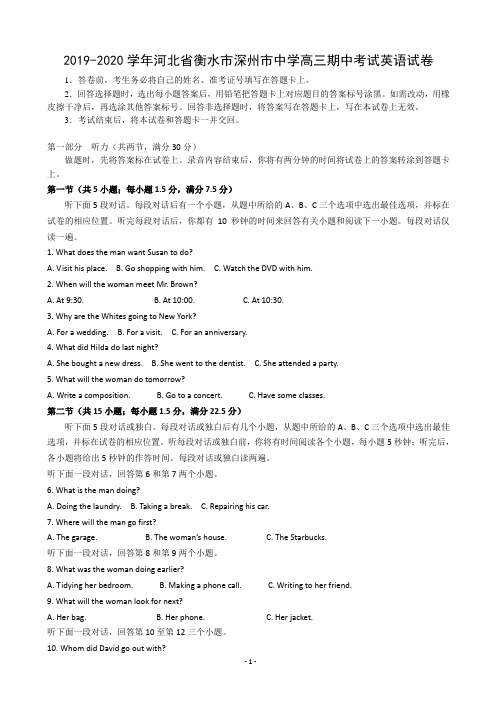
2019-2020学年河北省衡水市深州市中学高三期中考试英语试卷1.答卷前,考生务必将自己的姓名、准考证号填写在答题卡上。
2.回答选择题时,选出每小题答案后,用铅笔把答题卡上对应题目的答案标号涂黑。
如需改动,用橡皮擦干净后,再选涂其他答案标号。
回答非选择题时,将答案写在答题卡上,写在本试卷上无效。
3.考试结束后,将本试卷和答题卡一并交回。
第一部分听力(共两节,满分30分)做题时,先将答案标在试卷上。
录音内容结束后,你将有两分钟的时间将试卷上的答案转涂到答题卡上。
第一节(共5小题;每小题1.5分,满分7.5分)听下面5段对话。
每段对话后有一个小题,从题中所给的A、B、C三个选项中选出最佳选项,并标在试卷的相应位置。
听完每段对话后,你都有10秒钟的时间来回答有关小题和阅读下一小题。
每段对话仅读一遍。
1. What does the man want Susan to do?A. Visit his place.B. Go shopping with him.C. Watch the DVD with him.2. When will the woman meet Mr. Brown?A. At 9:30.B. At 10:00.C. At 10:30.3. Why are the Whites going to New York?A. For a wedding.B. For a visit.C. For an anniversary.4. What did Hilda do last night?A. She bought a new dress.B. She went to the dentist.C. She attended a party.5. What will the woman do tomorrow?A. Write a composition.B. Go to a concert.C. Have some classes.第二节(共15小题;每小题1.5分,满分22.5分)听下面5段对话或独白。
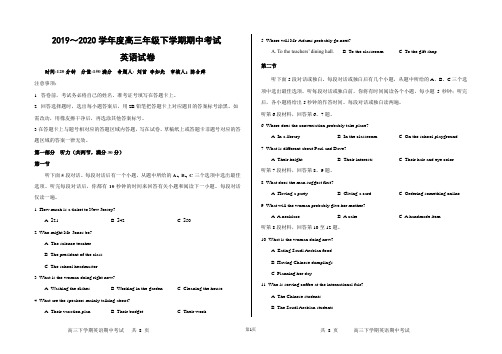
2019~2020学年度高三年级下学期期中考试英语试卷时间:120分钟分值:150满分命题人: 刘苗李如先审核人:陈合舜注意事项:1. 答卷前,考试务必将自己的姓名、准考证号填写在答题卡上。
2. 回答选择题时,选出每小题答案后,用2B铅笔把答题卡上对应题目的答案标号涂黑。
如需改动,用橡皮擦干净后,再选涂其他答案标号。
3.在答题卡上与题号相对应的答题区域内答题,写在试卷、草稿纸上或答题卡非题号对应的答题区域的答案一律无效。
第一部分听力(共两节,满分30分)第一节听下面5段对话。
每段对话后有一个小题,从题中所给的A、B、C三个选项中选出最佳选项。
听完每段对话后,你都有10秒钟的时间来回答有关小题和阅读下一小题。
每段对话仅读一遍。
1. How much is a ticket to New Jersey?A. $21.B. $42.C. $50.2. Who might Mr. Jones be?A. The science teacher.B. The president of the class.C. The school headmaster.3. What is the woman doing right now?A. Washing the dishes.B. Working in the garden.C. Cleaning the house.4. What are the speakers mainly talking about?A. Their vacation plan.B. Their budget.C. Their work. 5. Where will Mr. Adams probably go next?A. To the teachers’ dining hall.B. To the classroom.C. To the gift shop.第二节听下面5段对话或独白。
2018-2019学年度小学期高三年级二调考试英语试卷本试卷共150分,考试时间120分钟。
第一部分听力(共两节,满分20分)第一节(共5小题;每小题1分,满分5分)听下面5段对话。
每段对话后有一个小题,从题中所给的A、B、C三个选项中选出最佳选项,并标在试卷的相应位置。
听完每段对话后,你都有10秒钟的时间来回答有关小题和阅读下一小题。
每段对话仅读一遍。
1. How many minutes does the woman think John will be late for the meeting?A. 10 minutes.B. 15 minutes.C. 20 minutes.2. What does the man think the building will probably be?A. An apartment building.B. A hotel.C. A store.3. How does the man feel about his present job seeking?A.He is confident.B. He is tired of it.C. He is not quite sure.4. What do you know about the price of meat?A. It is going up every day.B. It is high everywhere.C. It is higher in other stores.5. Where does the conversation most probably take place?A. In the kitchen.B. In the living room.C. In the study.第二节(共15小题;每小题1分,满分15分)听下面5段对话或独白。
每段对话或独白后有几个小题,从题中所给的A、B、C 三个选项中选出最佳选项,并标在试卷的相应位置。
2019届高三上学期二调考试英语试卷本试卷共150分,考试时间120分钟。
第一部分听力(共两节,满分20分)第一节(共5小题;每小题1分,满分5分)听下面5段对话。
每段对话后有一个小题,从题中所给的A、B、C三个选项中选出最佳选项。
听完每段对话后,你都有10秒钟的时间来回答有关小题和阅读下一小题。
每段对话仅读一遍。
1. How many days does the man work overtime continuously?A. Five.B. Six.C. Seven.2. What does the man want the woman to know?A. His class is difficult to pass.B. Her program is very serious.C. About 30% students in his class will fail.3. How does the man feel about doing yoga?A. Excited.B. Relaxed.C. Anxious.4. What does the woman suggest the man do?A. Turn up the gas in the fireplace.B. Get some more wood from outside.C. Let the wood burn a bit more.5. What is the relationship between the speakers?A. Author and journalist.B. Publisher and reader.C. Writer and publisher.第二节(共15小题;每小题1分,满分15分)听下面5段对话或独白。
每段对话或独白后有几个小题,从题中所给的A、B、C三个选项中选出最佳选项。
听每段对话或独白前,你将有时间阅读各个小题,每小题5秒钟;听完后,各小题将给出5秒钟的作答时间。
2019-2020学年常州市第一中学初中部正衡中学高三英语期中试卷及答案第一部分阅读(共两节,满分40分)第一节(共15小题;每小题2分,满分30分)阅读下列短文,从每题所给的A、B、C、D四个选项中选出最佳选项AIn his 402nd anniversary year, Shakespeare is still rightly celebrated as a great language master and writer. But he was not the only great master of play writing to die in 1616, and he is certainly not the only writer to have left a lasting influence on theater.While less known worldwide, Tang Xianzu is considered one of Chinas greatest playwrights and is highly spoken of in that country of ancient literary and dramatic traditions.Tang was born in 1550 inLinchuan,Jiangxiprovince. Unlike Shakespeare's large body of plays,poems and sonnets (十四行诗), Tang wrote only four major plays: The Purple Hairpin, Peony Pavilion (《牡丹亭》), A Dream under the Southern bough, and Dream of Handan. The latter three were constructed around a dream narrative, a way through which Tang unlocked the emotional dimension of human desires and ambitions and explored human nature beyond the social and political limits of that time.Similar to Shakespeare, Tang's success rode the wave of a renaissance (复兴) in theater as an artistic practice. As in Shakespeare'sEngland, Tang's works became hugely popular inChinatoo. During Tang'sChina, his plays were enjoyed performed, and changed. Kunqu Opera, a form of musical drama, spread from southernChinato the whole nation and became a symbol of Chinese culture. Combining northern tune and southern music, kunqu Opera was known for its poetic language, music, dance movements and gestures. Tang's works benefited greatly from the popularity of kunqu Opera, and his plays are considered classics of kunqu Opera.While Tang and Shakespeare lived in a world away from each other, there are many things they share in common, such e humanity of their drama, their heroic figures, their love for poetic language, a lasting popularity and the anniversary during which we still celebrate them.1. Why is Shakespeare mentioned in the first paragraph?A. To describe Shakespeare's anniversary.B. To introduce the existence of Tang Xianzu.C. To explain the importance of Shakespeare.D. To suggest the less popularity of Tang Xianzu.2. What's possibly one of the main theme of Tang's works?A. Social reality.B. Female dreams.C. Human emotions.D. Political environment.3. What does the author mainly tell us in Paragraph 4?A. The influence of Kunqu Opera on Tang's works.B. Tang's success in copying Shakespeare's styles.C. The way Kunqu Opera became a symbol of Chinese culture.D. Tang's popularity for his poetic language and music.BScientists have recently discovered thatAndean condors (秀鹫)— some of the world’s largest birds——barely flap their wings at all while flying. Instead, they use rising air currents to remain in the air for hours.The Andean condor is the world’s largest soaring bird. They can weigh up to 15 kilograms. Their wings, when spread out, measure up to three meters. Their main food source is the meat of large animals which have died. Soaring high in the sky allows condors to easily spot possible meals on the ground.Scientists worked together to study the flight patterns of these huge birds and how much effort the birds use when flying. To study the birds while they were in the sky, the researchers attached special devices which could record every beat of their wings.The scientists learned that most of the condors’ flapping— over 75%— came when the birds were taking off. Once in the sky, the birds flew for very long periods of time without flapping at all. In fact, they only flapped their wings for 1% of the time they were in the air. One bird flew for over five hours without flapping, covering nearly 117miles.Soaring without flapping is important because birds bum energy every time they flap their wings.The birds’ soaring isn’t magic. They use the fact that hot air rises to keep themselves up. As hot air rises, it often creates “thermals”— currents of warm air moving upward. The condors soar by making use of these thermals. The tricky part is finding thermals and moving between them.When birds are forced to land and take off again often, it costs them a lot of energy. The researchers learned that to avoid having to land, the condors did most of their non-take-off flapping when they were closer to the ground and looking for a new thermal.The scientists reported that even though all of the condors they studied were young, they knew well how to take advantage of the air currents.4. What can we learn about the Andean condor from the text?A. They live mairly on small animals.B. Their wingspan is at least three meters.C. They rely on hot air to remain high in the sky.D. They are the birds with the strongest flying ability.5. Why was the equipment tied to the birds?A. To measure how far they could fly without flapping.B. To keep track of how often they flapped while flying.C. To calculate the energy required for their flight.D. To confirm their flight patterns.6. Which of the following acts consumes the most energy for a condor?A. Hunting for food.B. Flying in the sky.C. Getting off the ground.D. Landing on the ground.7. What can we infer from the text?A. Condors flap the most when looking for a new thermal.B. No condor can fly for more than five hours without flapping.C. Condors don’t need to look for thermals when soaring in the sky.D. Soaring by using thermals is probably a natural ability of condors.CSome people take their holiday decoration very seriously. And some take it to the next level. The Griffith family in Kenova, West Virginia, is in this camp. They put on a display that shows they’re just filled with Halloween spirit.Each year, this family displays 3,000 pumpkins (南瓜) in front of their home for the Halloween season. Yes, you readthatright. Ric Griffith puts out one jack-o’ -lantern (南瓜灯) for every person who lives in Kenova.Of course he doesn’t do it all on his own. He has a lot of help from his family, and also from members of the community who are super-proud of what has become quite the tourist attraction over the years. More than 30,000 people stop by to see the amazing display, which includes jack‑o’‑lanterns cut to look like the faces of famous people, animals, cartoon characters, and other creative designs. It’s certainly a must-see as part of the area’s Ceredo-Kenova Autumnfest.To fit in all 3,000 pumpkins, Griffith and his helpers spread them across the home’s garden and front porch(门廊), as well as on the roof!Griffith began the tradition back in 1978 with just fivepumpkins and, many years later, it’s much bigger and better. People can’t help but come to the area, walking along the sidewalk outside the house to get that perfect Halloween experience.“Locals take great pride in it, and then there are people from around the country who plan fall trips and include it in their trips so they can see it,” said Tyson Compton, president of the Cabell‑Huntington Convention and Visitors Bureau. “It’s really something.”“It’s become a tradition for many people in our area, and it feels good to keep that going,” Griffith said.8. What does the underlined word “that” in Paragraph 2 refer to?A. The Griffiths selling 3,000 pumpkins a day.B. Ric Griffith giving 3,000 jack-o’‑lanterns to tourists.C. Ric Griffith teaching 3,000 people how to display jack-o’‑lanterns.D. The Griffiths decorating their house with 3,000 pumpkins.9. What can we learn from Paragraph 3?A. Ric Griffith’s idea has received support from his community.B. There are only two kinds of jack-o’‑lanterns.C. Ric Griffith dislikes asking for help from others.D. There are 30,000 people in Kenova.10. What do we know about the tradition?A. It began with 1,978 pumpkins.B. It has lasted more than 40 years.C. It includes five pumpkin competitions.D. It encourages people to do more exercise.11. What’s Tyson Compton’s attitude towards the tradition?A. Worried.B. Uncaring.C. Favorable.D. Uncertain.DI was checking out at the supermarket counter on Wednesday night, ready to pay for my bananas, when all ofa sudden, fear came upon me. My wallet was gone. And I could only have left it one place: the G9 bus, from which I had gotten off minutes earlier and which was now speeding to some stops. The moment of realizing it was gonewas followed by mental math. How much time and money would it cost to replace the credit cards, the driver's license, the expensive lipstick ($ 55!).Two hours after I was back at my house, I heard a knock on the door. My husband answered while I sat in the dining room on the phone with a credit card company. "Does Jennifer live here?" I heard someone say. In her hand was my wallet, without a penny missing. She left before I could offer my gratitude to her.After I posted the story, I heard from her boyfriend, who identified the good citizen as Erin Ball, a 26-year-old girl working for a trade organization.Once I figured out her, I called to thank her. She said she spotted my wallet and thought that it's more dangerous to go to a stranger's house than leaving the wallet with the driver, but she still decided to take the chance. "If I were in that situation, I would want someone to try to find me," she said. Ball doesn't find her actions particularly excellent. She added, "It's not hard to do small things for people."After Ball found my wallet, she decided to post a picture of my driver's license online before going to my house, trying to see if anyone knew me. No sooner had she left my doorstep than I got emails from two neighbors who recognized my face, both offering to help me find my missing property.Ball found my house on a bitterly cold night for which I was extremely grateful. Looking back, I'm not surprised someone had wanted to help a stranger. A warm current of honesty and harmony is running through this town.12. What do we know about the author according to paragraph 1?A. She missed the G9 bus.B. She paid for her bananas.C. She replaced the credit cards.D. She found she had left her wallet on the bus.13. Who helped the author find Ball?A. The G9 driver.B. The girl's boyfriend.C. The author's neighbors.D. The author's husband.14. What did Ball do first after finding the wallet?A. Ball called the author.B. Ball went to the author's house.C. Ball gave the wallet to the bus driver.D. Ball posted a photo of the author's driving license.15. Which of the following best describes Erin Ball?A. Humorous and kind.B. Generous and demanding.C. Honest and warm-hearted.D. Caring and outgoing.第二节(共5小题;每小题2分,满分10分)阅读下面短文,从短文后的选项中选出可以填入空白处的最佳选项。
河北省衡水中学2019届高三上学期第16周周测英语试题Editors: DongBaoyu GuoYi AnWence第I卷(选择题满分90分)第一部分听力(共两节,满分20分)第一节(共5小题;每小题1分,满分5分)听下面5段对话。
每段对话后有一个小题,从题中所给的A、B、C三个选项中选出最佳选项,并标在试卷的相应位置。
听完每段对话后,你都有10秒钟的时间来回答有关小题和阅读下一小题。
每段对话仅读一遍。
1.How did Sarah get home last night?A. By trainB. By busC. By car2. When is the woman getting married?A. In OctoberB. In NovemberC. In December3. Who is the woman?A. A new workerB. A regularC. A shop manager4. Where is Mary?A. In th e manager’s officeB. In the meeting roomC. In her office5. What book did the woman buy?A. CookingB. HistoryC. Traveling第二节听下面5段对话或独白。
每段对话或独白后有几个小题,从题中所给的A、B、C三个选项中选出最佳选项,并标在试卷的相应位置。
听每段对话或独白前,你将有时间阅读各个小题,每小题5秒钟;听完后,各小题将给出5秒钟的作答时间。
每段对话或独白读两遍。
听第6段材料,回答第6、7题。
6. Where are the speakers?A. At the man’s homeB. At a shopC. In a car7. What has the woman forgotten to bring with her?A. Her bagB. Some moneyC. A map听第7段材料,回答第8、9题。
1 2018—2019学年度上学期高三年级期中考试 第一部分 听力 1-5 CABBC 6-10 BABAC 11-15 ABCCA 16-20 ACACB 第二部分 阅读理解 第一节 (A) ADCA (B) DCDA (C) DADA (D) BBD 第二节 36-40 ACFDB 第三部分 语言知识运用 第一节 41-45 DADAC 46-50 CBBCA 51-55 ABCDD 56-60 BACDB 第二节 61. are faced 62. increasingly 63. is 64. popularity 65. checking 66. themselves 67. recognized/recognised 68. suggestions 69. whether 70. an 第三节 词汇运用 71. slightly 72. measuring 73. impression 74. inspiring 75. failure 76. To my satisfaction 77. referring to 78. on the spot 79. Brought up 80. Tasting 第四部分 写作 第一节 短文改错 I will share one experience with you. With the College Entrance Examination draw near, I drawing 2
was filled with great anxiety. However, I couldn’t be absorbed in study, resulting from my failing Therefore in in the examination. I got very discouraging. Just then, my teacher, Miss Zhang, approach me and discouraged approached said, “In life we all have moment when we can’t achieve what we want it. It is natural. Don’t moments allow those moments to weaken you, and turn them into motivation to inspire you.” Her words but were a reminder which provided myself with constant encouragement to smile at life. me Consequently, I gained what I deserved. So it is an optimistic attitude which matters most of all. It gives you the confidence to deal that with difficulties and to achieve what you want in your life. 第二节 书面表达 Dear John, I am Li Hua, chairman of the Student Union of Hengshui High School. I am writing this letter on behalf of our school that we are more than glad to donate to your school some books on Chinese traditional culture. After discussion, we plan to donate about a hundred books, whose topics vary from Chinese ancient philosophy, Chinese traditional painting and calligraphy to Chinese classical literature. We plan to wrap them in a big parcel and post to your school. So I hope you can offer me the accurate address of your school as well as the name of the person in charge of receiving the parcel. Looking forward to your reply. Yours faithfully, Li Hua 听力原文 Text 1 M: Does this bus go to the beach? (1) W: No. You’re going the wrong way. You want the Number 11 bus. It stops in front of the post 3
office. Text 2 M: You look sleepy this morning, Beverly. Did you go to bed late last night? W: No, I slept through my alarm this morning, (2) so l didn’t get a chance to shower. Text 3 W: Bread, milk, eggs. I think that’s all we need. So, do you want to come with me? M: Sure. I’ll drive. Don’t forget to write down sugar and chocolate, though. (3) They are the most important materials. Text 4 W: It’s so nice to see the animals in large open spaces, closer to their natural environment. I wasn’t expecting this. (4) M: I know. Some zoos can be disappointing. At least these animals seem happy. Text 5 M: It was the third time Roger had phoned me to say he had a new job. It was so surprising. W: It’s difficult to keep a young man in one job for life nowadays. (5) Well, times are changing. Text 6 W: Congratulations on your new job. (6) I know you worked hard for it. Cheers! M: Cheers! It has been a pleasure working with you all these years. I’ll make sure to come back and visit next month. W: You’d better. Work won’t be the same without you. So, when do you start? M: I went in today to fill out some paperwork, but I won’t start until the following Monday. (6) W: That’s great. Let me pay for your lunch. (7) It’s my turn, anyway. M: No, it’s all right. I owe you for everything you have done for me. (7) W: Thanks. So, I’ll see you tomorrow, then? M: Of course. Bye. Text 7 M: Great job on your chemistry test, Anna! (8) This is your second “B” in a row! W: “B-plus” actually. (8) So there is a small improvement, Dad. (10) M: So what have you been doing? You used to be a “D” student before. W: I’ve joined a study group. (9) Our members discuss all the difficult stuff, and we test each 4
other all the time. M: Great idea. Maybe you will have more time on the weekends to go out with your friends. How did you find the study group? W: I saw a notice on the message board at lunch one day. I decided to check it out, and now we meet once a week after our last class of the day. (9) M: So that’s why you’ve been coming home late. Good for you. So, you’re not nervous about your chemistry tests anymore? W: Not at all. I am more prepared than ever. Text 8 W: Jonathan! Look at all these dirty clothes! Grab your laundry basket. It’s time to teach you how to use the washing machine. M: Oh, Mom! Do I have to? W: Yes. You’re sixteen now. I was doing laundry when I was half your age. (11) Your sister has been doing it since she was ten. So, it’s your turn to learn. M: Fine. It’s just that there are so many buttons and settings. W: It’s easy once you know how to do it. This is the “load” setting. Choose small, medium, or large based on how many clothes you’re washing. I’m sure you can figure that out for yourself. M: I can do that. W: Good. Next, you choose the temperature. Cold, warm, or hot. Just use cold for now, (12) and I’ll deal with anything that needs to be washed in warmer temperatures. M: And the spin cycle? W: That is for how fast the machine turns. “Normal” is what you will be using for most of your clothes. “Heavy” is for your jeans and towels. “Light” is for your sheets and pillow cases, (13) but I’ll do those for you. M: You know what, Mom? Washing clothes is actually pretty easy. W: Everything is, once you know how to do it. Text 9 (第16题为推断题) W: Why are we down here again? M: We’re looking for a box marked “Christmas decorations”. What’s the matter? W: I don’t like cold, dark places. I feel like I’m in a scary movie. Also, I hate rats.